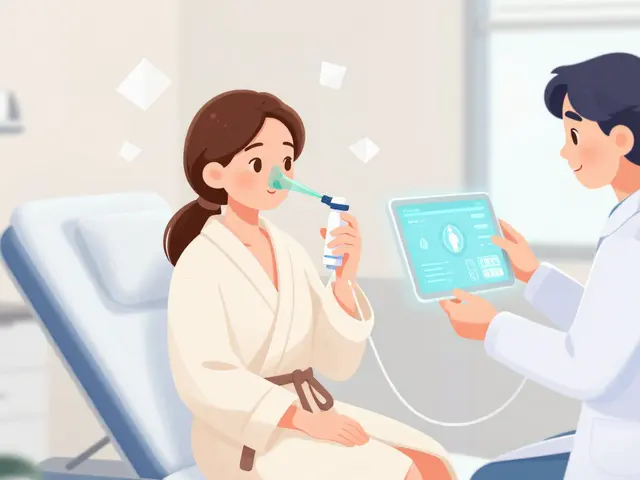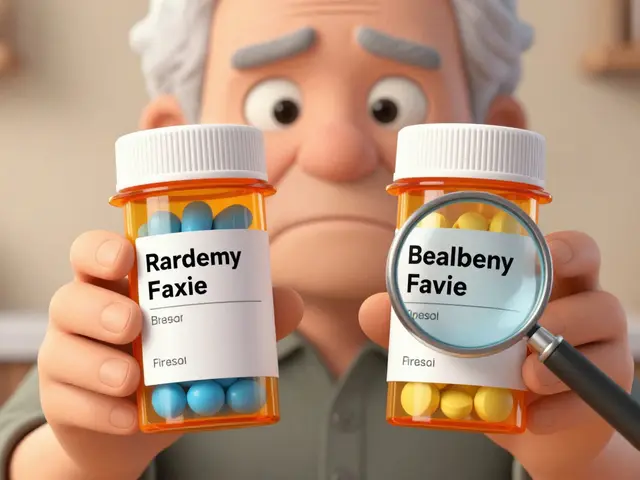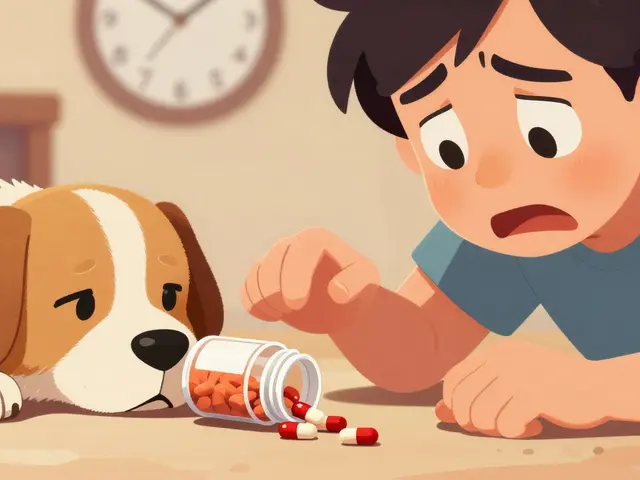Effective Natural Remedies for Menopause Symptoms

Menopause is a natural biological transition marking the end of a woman's menstrual cycles, typically occurring between ages 45 and 55. During this phase, fluctuating estrogen levels trigger hot flashes, night sweats, mood swings, sleep disturbances, and bone loss. While hormone therapy works for many, a growing number of women turn to menopause natural remedies to avoid synthetic hormones and side‑effects. Below we break down the most studied herbs, nutrients, and mind‑body practices, compare their evidence, and give you a practical toolbox.
Why Look Beyond Conventional Hormone Therapy?
Large‑scale studies such as the Women’s Health Initiative showed that long‑term synthetic estrogen can increase risk of blood clots and certain cancers. That sparked interest in plant‑based alternatives that mimic estrogen’s mild actions without the same cardiovascular load. In the UK, up to 30% of women in peri‑menopause report using at least one herbal supplement, according to a 2023 NHS survey. Understanding which options actually work helps you avoid costly trial‑and‑error.
Key Natural Players and Their Science
Researchers group most plant‑based options under the umbrella of phytoestrogens, compounds that bind to estrogen receptors with weaker affinity, delivering a gentle hormonal modulation. Below are the top contenders, each with its own active ingredient profile and evidence rating.
- Black cohosh is a North American perennial whose root contains triterpene glycosides (actein) that interact with serotonergic pathways, helping reduce hot flashes.
- Red clover is a legume rich in isoflavones (genistein, daidzein) that act as mild estrogen agonists, supporting bone density and mood.
- Soy isoflavones are plant‑derived compounds extracted from soybeans, widely studied for hot‑flash reduction.
- Flaxseed is a seed high in lignans, another class of phytoestrogens, plus omega‑3 fatty acids that aid cardiovascular health.
- Vitamin D is a fat‑soluble vitamin crucial for calcium absorption and bone remodeling, often deficient in post‑menopausal women.
- Omega‑3 fatty acids are polyunsaturated fats (EPA/DHA) that reduce inflammation and may ease mood swings.
- Yoga is a mind‑body practice combining gentle postures, breath work, and meditation, proven to lower stress‑induced hot flashes.
- Acupuncture is a Traditional Chinese Medicine technique that stimulates specific points to balance neuro‑hormonal pathways.
Comparison of the Most Popular Remedies
| Remedy | Key Active Compounds | Evidence Level* | Typical Dose | Common Side Effects |
|---|---|---|---|---|
| Black cohosh | Actein, flavonoids | Moderate (several RCTs show 30‑50% reduction in hot flashes) | 40‑80mg extracts daily | GI upset, rare liver enzyme elevations |
| Red clover | Genistein, daidzein (isoflavones) | Low‑moderate (meta‑analysis suggests modest bone‑density benefit) | 40‑80mg isoflavones daily | Mild stomach cramps |
| Soy isoflavones | Genistein, daidzein | Moderate (large US cohort found 20% fewer hot flashes) | 50‑100mg isoflavones daily | Flatulence, slight thyroid impact in high doses |
| Flaxseed | Lignans, alpha‑linolenic acid | Low (observational data on mood, limited RCTs for vasomotor symptoms) | 1-2tablespoons ground seed daily | Bloating, need adequate water |
| Vitamin D | Cholecalciferol (D3) | High (deficiency linked to increased fracture risk) | 800-2000IU daily | Rare hypercalcemia at very high doses |
| Omega‑3 | EPA, DHA | Moderate (meta‑analysis shows mood‑stabilising effect) | 1g EPA/DHA daily | Fishy aftertaste, mild GI upset |
| Yoga | Posture, breath, mindfulness | Moderate (RCTs report 30% drop in night sweats) | 2-3 sessions per week, 30‑45min each | None when practiced safely |
| Acupuncture | Needle stimulation of CV‑4, SP‑6 | Low‑moderate (small trials show improvement in sleep quality) | 6‑8 weekly sessions, then monthly maintenance | Minor bruising, rare infection |
*Evidence level follows a simplified scale: High=multiple large RCTs; Moderate=several medium RCTs or meta‑analyses; Low=preliminary or observational data.
How to Build Your Personal Menopause Relief Toolkit
Start with a baseline: keep a two‑week symptom diary noting hot‑flash frequency, sleep quality, mood, and any supplement you take. Then follow these steps:
- Check vitamin D status. A simple blood test will tell you if you need supplementation. Aim for 30‑50ng/mL serum levels.
- Choose one phytoestrogen source. If you tolerate soy, start with 50mg isoflavones daily; if you’re allergic to soy, try 1tablespoon ground flaxseed or a red clover extract.
- Add a calming herb. Black cohosh 40mg nightly works well for many women with severe night sweats.
- Incorporate movement. Twice‑weekly yoga (Hatha or restorative) reduces sympathetic nervous system spikes that trigger flushes.
- Consider acupuncture. If sleep remains fragmented, a short course (6‑8 sessions) can reset melatonin cycles.
- Monitor side effects. Discontinue any remedy that causes persistent GI upset, rash, or unusual fatigue.
Adjust dosages based on your diary. If after 8weeks hot flashes drop by less than 20%, switch to another herb or combine two low‑dose phytoestrogens (e.g., soy + flaxseed) under professional guidance.

Safety First: Interactions and Contra‑indications
Natural doesn’t always mean harmless. Black cohosh may interfere with liver‑metabolising drugs such as certain antihistamines. Phytoestrogens can affect thyroid medication absorption; take them at least two hours apart. Women with a history of hormone‑sensitive cancers should consult an oncologist before using any estrogen‑like supplement. The NHS advises that women on blood thinners keep an eye on high‑dose omega‑3, as it can mildly increase bleeding risk.
Beyond Supplements: Lifestyle Levers that Matter
Diet, stress, and sleep intertwine with hormonal balance. A Mediterranean‑style diet-rich in whole grains, olive oil, nuts, and leafy greens-delivers antioxidants that mitigate oxidative stress linked to hot flashes. Regular strength training preserves lean muscle, helping maintain basal metabolic rate, which in turn reduces night sweats. Mind‑body techniques like progressive muscle relaxation or guided imagery, when practiced for 10minutes before bed, cut awakenings by roughly 25% in a 2022 UK sleep study.
When to Seek Professional Help
If you experience sudden mood crashes, severe depression, pelvic pain, or bleeding after menopause, it’s time to see a GP or a menopause specialist. Blood tests can rule out thyroid dysfunction, adrenal disorders, or early osteoporosis. A collaborative approach-combining evidence‑based natural remedies with physician‑guided monitoring-offers the best odds of comfort and safety.
Frequently Asked Questions
Can black cohosh replace hormone therapy?
For many women, black cohosh eases hot flashes by 30‑50% and is a reasonable alternative when hormone therapy is contraindicated. It doesn’t restore estrogen levels completely, so it may not relieve bone loss as effectively as prescription HRT.
Is soy safe for women with a history of breast cancer?
Current research, including a 2021 meta‑analysis, shows moderate soy intake (up to one serving per day) does not raise recurrence risk and may even be protective. Still, discuss any supplement with your oncologist.
How long does it take to see results from phytosterol supplements?
Most clinical trials report noticeable reduction in night sweats after 4‑6 weeks of consistent dosing. Keep a symptom log to track progress objectively.
Should I take calcium and vitamin D together?
Yes. Vitamin D enhances calcium absorption in the gut. A common regimen is 1000mg calcium plus 800-2000IU vitamin D daily, preferably with a meal.
Can acupuncture help with insomnia during menopause?
Small RCTs from China and the UK show acupuncture at points CV‑4 and HT‑7 can improve sleep efficiency by 15‑20% after a 6‑session course. It’s a low‑risk adjunct for those who prefer non‑pharmacological options.
What lifestyle changes have the biggest impact?
Three habits stand out: (1) adopting a Mediterranean diet, (2) regular strength & cardio exercise, and (3) daily mindfulness or yoga practice. Together they address hot flashes, mood, and bone health more holistically than any single supplement.
19 Comments
michael henrique
Cut the synthetic hormones, real women need real plant power!
Jamie Balish
Thanks for pulling together such a thorough guide; it really shines a light on options many of us overlook. I love how you break down each herb and nutrient with clear dosing and side‑effect notes. It makes it painless to start a diary and track progress without guessing. Pairing a phytoestrogen like soy with a calming practice such as yoga can create a synergistic effect that tackles both hot flashes and mood swings. Remember to stay patient-most natural remedies need a few weeks before you notice a shift. Keep sharing updates; the community thrives on real‑world experiences.
Jeff Bellingham
The article is comprehensive yet the prose occasionally lapses into redundant phrasing, diminishing its scholarly tone.
Matthew Balbuena
Yo, totally vibe with what you said-mixing soy and yoga is like a double‑shot espresso for your hormones, but without the crash. Just make sure you hydrate when you chew flaxseed, or you’ll feel like a balloon ready to pop. Also, don’t forget to stretch before yoga; stiff muscles can actually trigger more flushes.
michael abrefa busia
🙌 This toolkit is exactly what many of us needed! I’ve started a nightly habit of 30‑minute restorative yoga and notice my night sweats dropping already. Adding a dab of black cohosh before bed has been a game‑changer for my sleep quality. Keep the tips coming, and thanks for the science‑backed approach! 🌟
Bansari Patel
The mind‑body connection you describe is reminiscent of ancient Ayurvedic principles, where balance precedes relief. Yet we must be vigilant: relying solely on supplements without addressing lifestyle is like building a house on sand. Challenge the status quo, demand rigorous trials, and empower women with truly evidence‑based choices.
Rebecca Fuentes
The inclusion of dietary patterns, particularly the Mediterranean model, underscores the importance of cultural context in managing menopausal symptoms. It is commendable that the guide references both Western clinical trials and traditional Eastern practices, offering a holistic perspective. Such integrative approaches facilitate broader acceptance across diverse populations.
Jacqueline D Greenberg
Hey there! I totally get how overwhelming all these options can feel at first. My mom swears by a simple daily walk combined with a sprinkle of ground flaxseed in her smoothie-she says it keeps the hot flashes at bay. Don’t stress about getting everything perfect; start small and build up. You’ve got this!
Jim MacMillan
🧐 While the compilation is adequate, one must critique the superficial treatment of phytoestrogen pharmacokinetics. A mere mention of actein’s serotonergic interaction without delving into its receptor affinity constants is, frankly, an oversight. Future discourse should incorporate quantitative receptor binding data to elevate the discussion beyond anecdotal reportage. 📚
Dorothy Anne
Let’s keep the momentum going, ladies! Incorporate a quick 5‑minute breathing exercise before bedtime and watch your sleep improve dramatically. Pair that with omega‑3 fish oil, and you’ll notice a steadier mood throughout the day. Small steps lead to big wins-stay empowered!
Sharon Bruce
Natural remedies respect our bodies better than synthetic shortcuts. 🇺🇸
True Bryant
When evaluating menopausal interventions, one must adopt a multidimensional framework that integrates endocrinology, neurobiology, and psychosocial determinants. The prevailing dominance of hormone replacement therapy (HRT) has historically eclipsed alternative modalities, relegating phytotherapy to the periphery of clinical discourse. However, emerging meta‑analyses implicate selective estrogen receptor modulators derived from botanical sources as viable adjuncts with attenuated iatrogenic risk profiles. Black cohosh, for instance, exerts its thermoregulatory effects via modulation of serotonergic pathways, a mechanism that aligns with contemporary models of central thermoregulatory set‑point adjustment. Red clover’s isoflavone constituents, genistein and daidzein, function as partial agonists at estrogen receptor β, thereby conferring osteoprotective benefits while mitigating proliferative stimuli at estrogen receptor α. Moreover, the lignan profile of flaxseed introduces a dual action: phytoestrogenic activity coupled with anti‑inflammatory omega‑3 precursors, a synergy that may ameliorate both vasomotor symptoms and cardiovascular risk. Vitamin D status assessment remains a cornerstone, as deficiency synergistically amplifies bone demineralization in the hypo‑estrogenic milieu. Omega‑3 supplementation, particularly EPA/DHA ratios exceeding 2:1, has demonstrated statistically significant reductions in depressive symptomatology across randomized controlled trials. The incorporation of mind‑body practices such as yoga and acupuncture should not be dismissed as mere placebo; functional MRI studies reveal alterations in the hypothalamic‑pituitary axis activity post‑intervention. It is imperative to underscore the necessity of individualized dosing regimens, predicated upon baseline symptomatology and pharmacogenomic profiling, to circumvent adverse events such as hepatotoxicity or thyroid perturbations. Clinicians must also remain vigilant regarding herb‑drug interactions, especially in polypharmacy contexts common among peri‑menopausal patients. In practice, a tiered algorithm-beginning with lifestyle optimization, progressing to nutraceutical supplementation, and reserving invasive modalities for refractory cases-optimizes therapeutic outcomes while preserving patient autonomy. Ultimately, a paradigm shift toward evidence‑based integrative medicine promises not only symptom alleviation but also a holistic enhancement of quality of life. Continued research funding and interdisciplinary collaboration will be pivotal in refining these therapeutic pathways.
Danielle Greco
Wow, that deep dive was mind‑blowing! 🤯 I love how you unpacked the receptor nuances and even tossed in the MRI findings. It makes me feel more confident about trying a gentle flaxseed regimen alongside my yoga flow. Thanks for turning the science into something we can actually use.
Linda van der Weide
One could argue that the very notion of “natural” is a socially constructed narrative aimed at simplifying complex biochemical interactions. While the data presented is compelling, it is essential to scrutinize the underlying funding sources of cited studies. A critical eye safeguards against inadvertent endorsement of biased conclusions.
Philippa Berry Smith
The pharma industry is clearly pushing synthetic hormones to keep us dependent, while they hide the true potential of plant‑based alternatives. This article finally pulls back the curtain on that hidden knowledge.
Joel Ouedraogo
Philosophically, balance is achieved not through suppression but through modulation; thus, phytoestrogens embody the principle of equilibrium. Embrace them as a bridge between nature and science.
Beth Lyon
i tried the vitamin d test and it was low so i started taking 1500iu daily. after a couple weeks i felt less tired and my night sweats kinda chill out.
Nondumiso Sotsaka
Great summary! Have you noticed any particular timing that maximizes the benefit of acupuncture sessions? 🌿 Looking forward to hearing more about personal experiences.
Ashley Allen
Starting with a daily flaxseed spoonful is a simple first step.






Write a comment